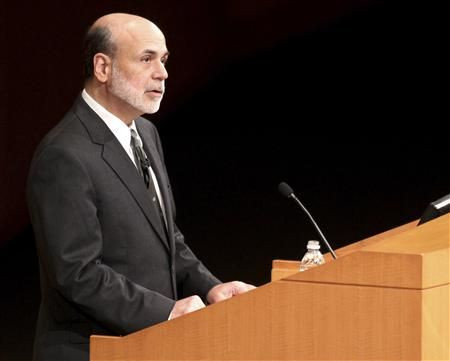Fed Holding Rates Down Until 2014, Considers More Stimulus

(Reuters) - Federal Reserve Chairman Ben Bernanke said Wednesday the central bank was ready to offer the economy additional stimulus after it announced it would likely keep interest rates near zero until at least late 2014.
The Fed also took the historic step of adopting an explicit inflation target, though Bernanke took pains to stress that officials would be flexible about reining in price growth when unemployment was too high.
The late 2014 timeframe for the first rate hike was considerably later than investors had expected and some 18 months later than the Fed had suggested last year, and the announcement prompted a rally in U.S. government bonds.
Speaking at a news conference after a two-day policy meeting, Bernanke was cautious about recent improvements in the U.S. economy, and he left the door open to further Fed bond purchases.
I don't think we're ready to declare that we've entered a new, stronger phase at this point, Bernanke said. If the situation continues with inflation below target and unemployment declining at a rate which is very, very slow, then ... the logic of our framework says we should be looking for ways to do more.
In response to the deepest recession in generations, the Fed slashed the overnight federal funds rate to near zero in December 2008. It has also more than tripled the size of its balance sheet to around $2.9 trillion through two separate bond purchase programs.
The policy is credited with preventing an even more devastating downturn, but it has been insufficient to bring unemployment down to levels considered normal during good economic times. Many Fed watchers expected a further round of bond buying, likely focusing on mortgage debt.
RANGE OF VIEWS
Fed officials agreed that a goal of 2 percent inflation would be in keeping with their congressional mandate of price stability. By their favorite measure, core inflation is running at about 1.7 percent.
They declined to announce a target for unemployment, saying the job market was often influenced by forces beyond their control.
In another key shift touted as part of an effort toward greater transparency, the Fed for the first time published policymakers' projections for the appropriate path of the benchmark overnight federal funds rate.
These showed a wide range of views, from the three of 17 policymakers who said they thought rates should rise this year to two who want to hold off on any increase until 2016.
Still, the biggest concentration of estimates - five of 17 - was around 2014. The new, later expiration date for the Fed's zero rate policy pushed stock and gold prices higher, and dragged the dollar lower.
In its announcement, the Fed repeated its view that the economy faced significant downside risks - an expression that has become code for the threat Europe's debt crisis poses to the United States.
In economic forecasts accompanying the rate projections, the Fed pointed to somewhat weaker economic growth this year and next, compared with estimates published in November. Meanwhile, the unemployment rate, which hit 8.5 percent in December, was seen coming down only slowly.
Economic conditions are likely to warrant exceptionally low levels for the federal funds rate at least through late 2014, the central bank said. After every previous policy meeting dating to August, the Fed had said rates were not likely to rise until mid-2013.
Make no mistake, with changing 2013 to 'at least through late 2014' this drives home one important fact: the Fed is scared, said Tom Porcelli, chief U.S. economist at RBC Capital Markets in New York.
Richmond Federal Reserve Bank President Jeffrey Lacker, an inflation hawk who rotated into a voting panel seat this year, dissented from the policy decision, preferring to omit the late-2014 date from the Fed's post-meeting statement.
INFLATION NOT A WORRY
The central bank appeared more sanguine on inflation than it had after its last meeting in December, saying prices were likely to run close to or just below its target. The statement dropped a reference to the Fed monitoring inflation and inflation expectations.
Aside from the 2014 rate pledge, the statement hewed closely to the Fed's last policy pronouncement in mid-December.
It described the unemployment rate as still elevated and, in a slight shift, acknowledged a slowing in business investment.
I think what they are seeing is that the rate of growth is not sufficient to bring down the unemployment rate, said Brian Dolan, chief strategist at FOREX.com in Bedminster, New Jersey.
In December, the U.S. jobless rate stood at 8.5 percent, and some 13 million Americans were still actively looking for work but could not find it.
While forecasters expect the U.S. economy grew at a 3 percent annual rate in the last three months of 2011, they look for growth of just around 2 percent this year.
(Editing by Tim Ahmann and Andrea Ricci)
© Copyright Thomson Reuters 2024. All rights reserved.





















